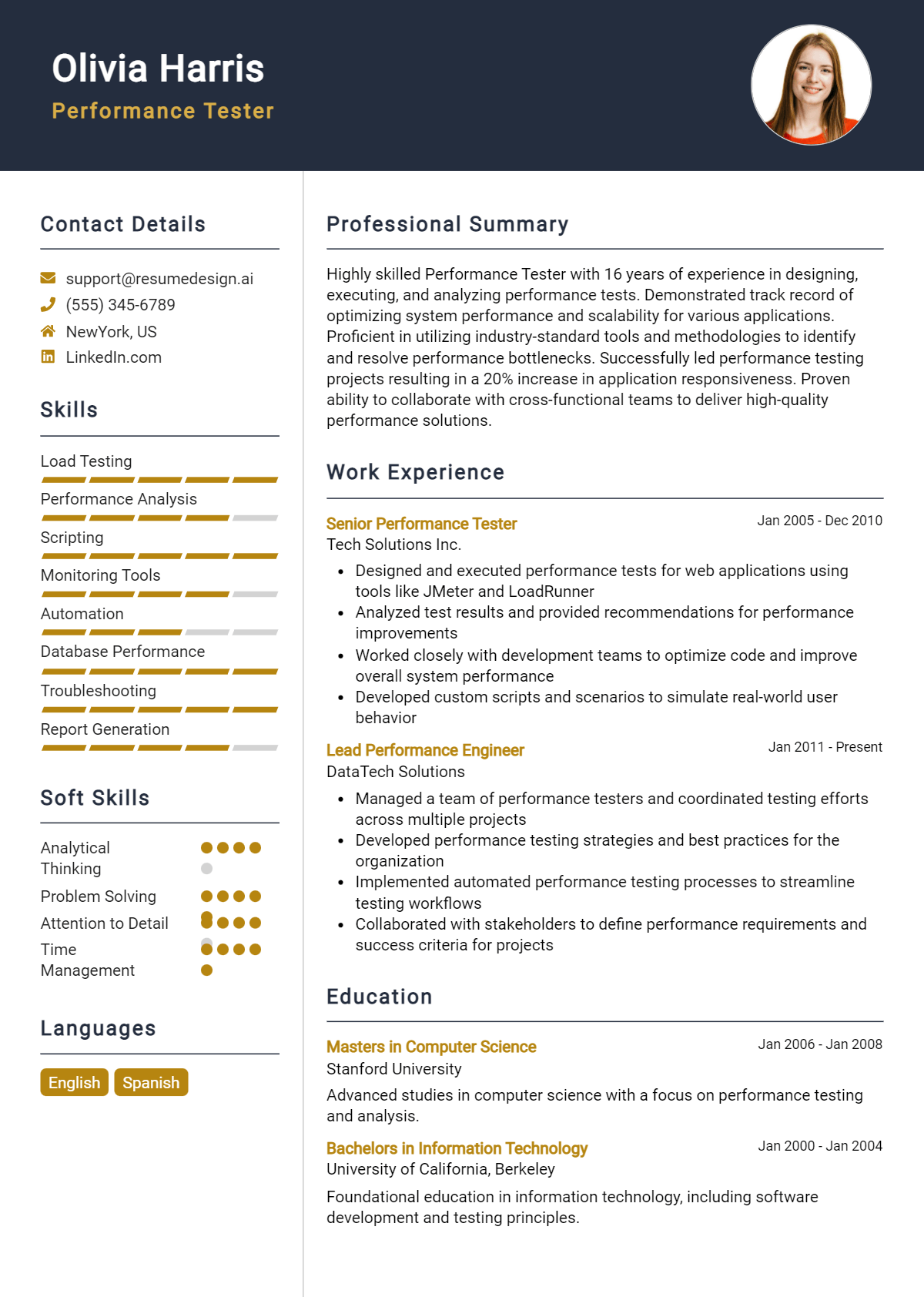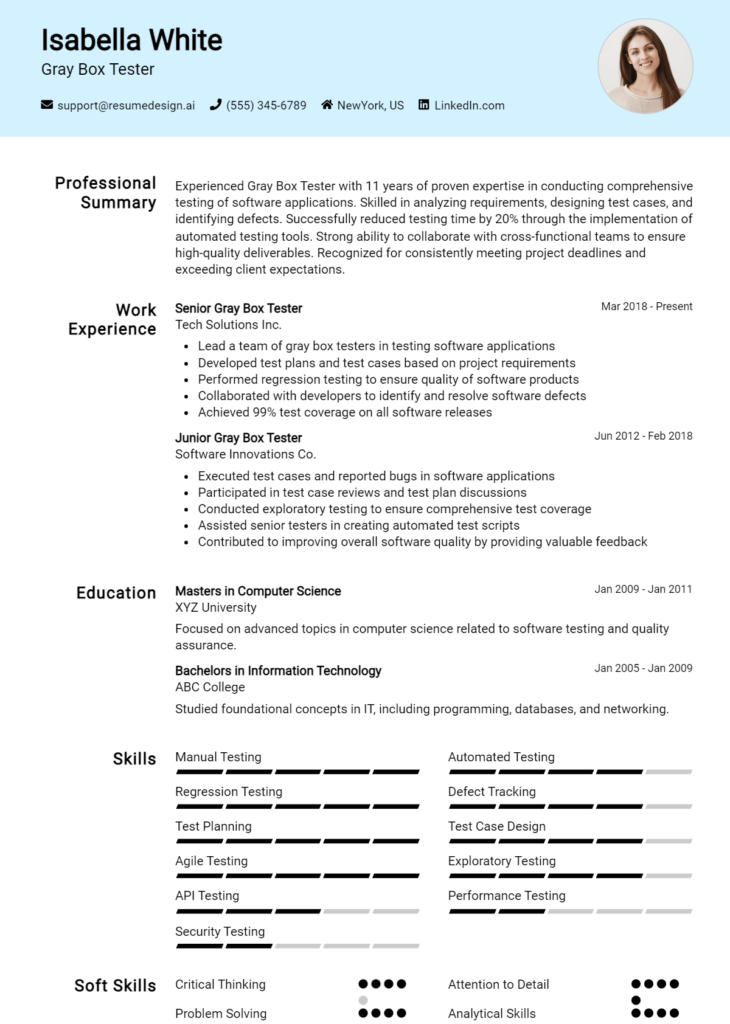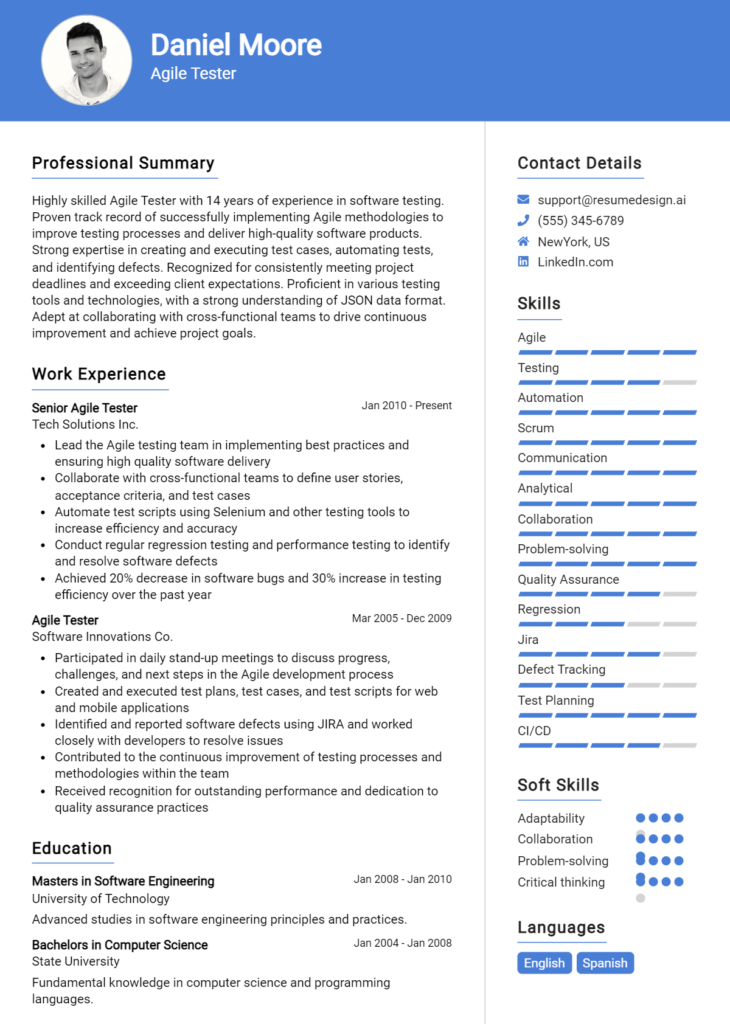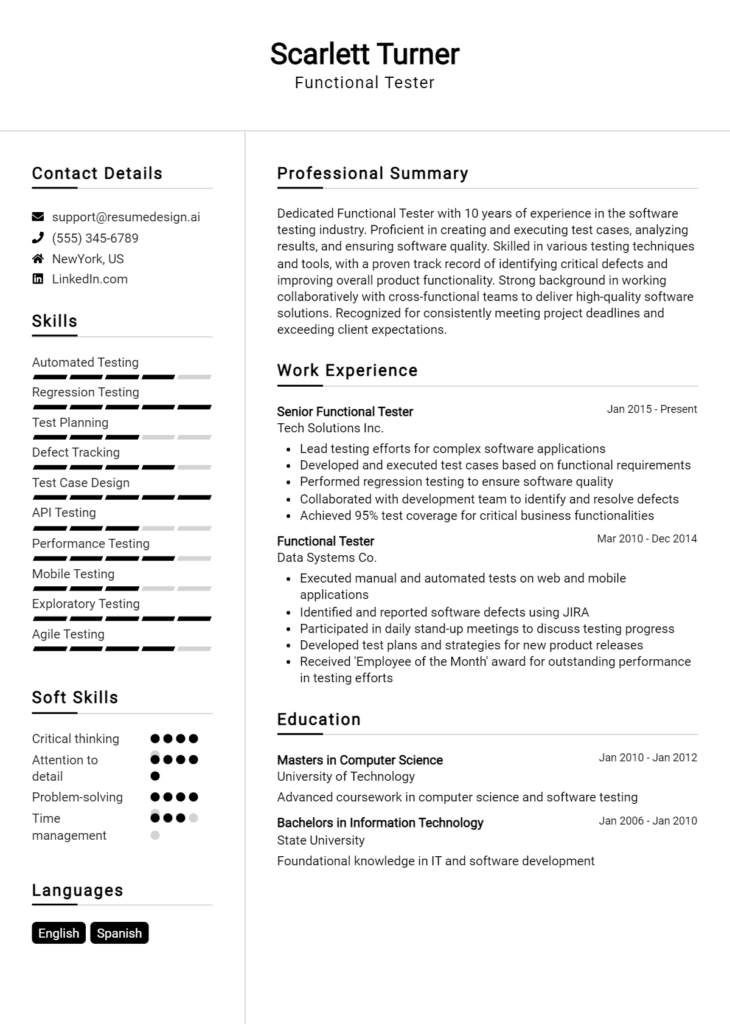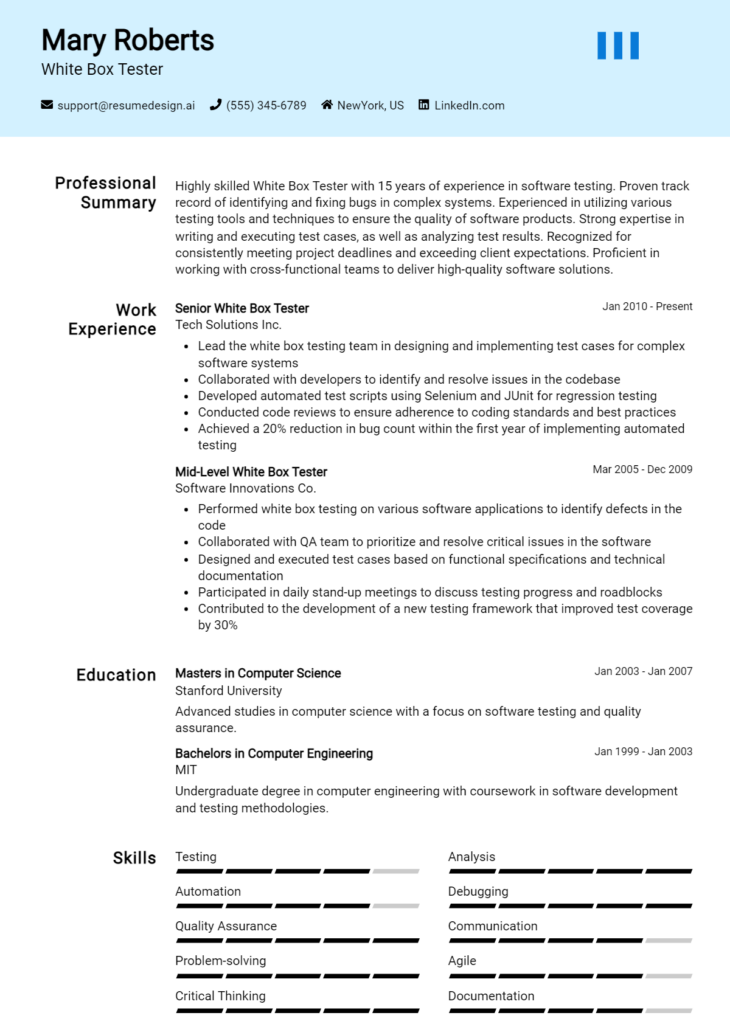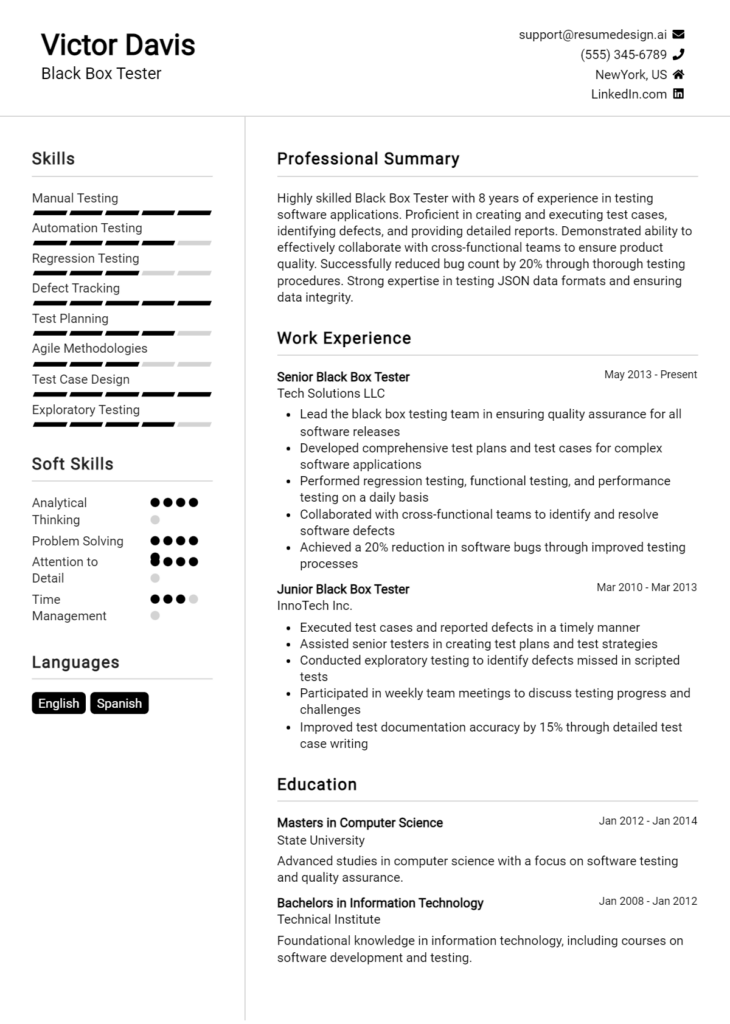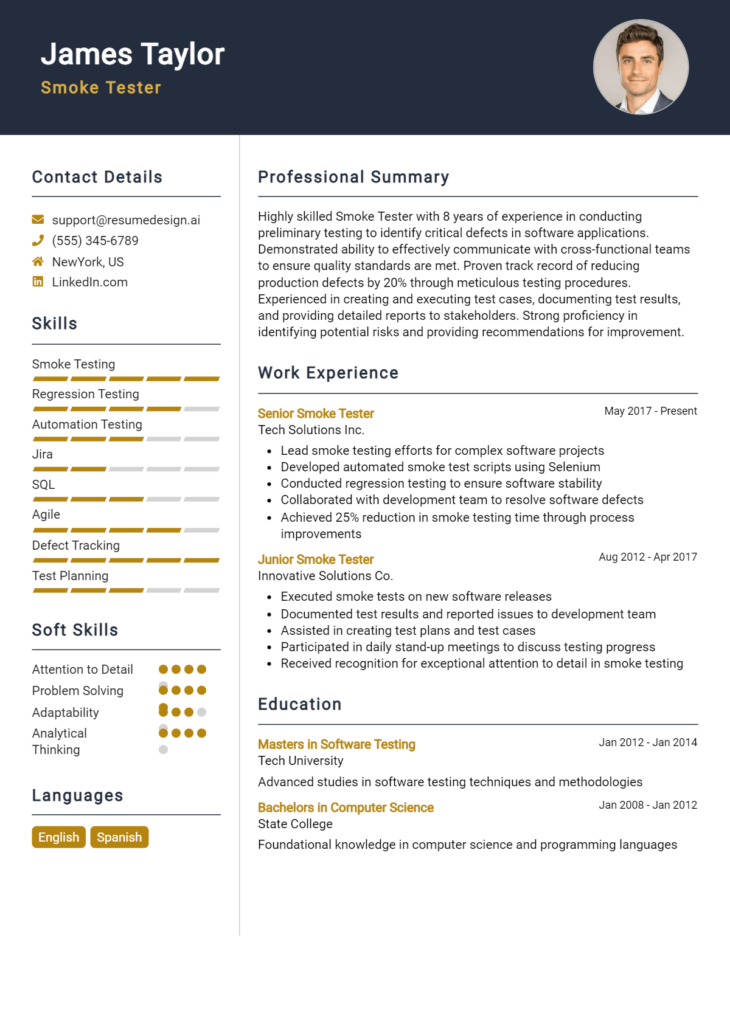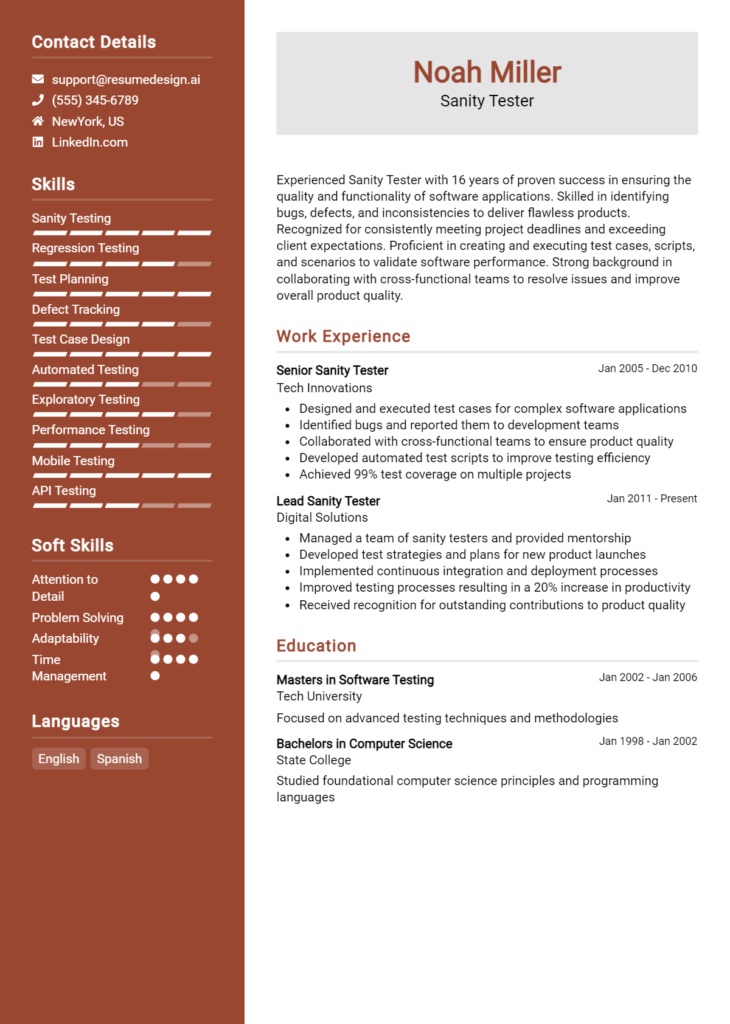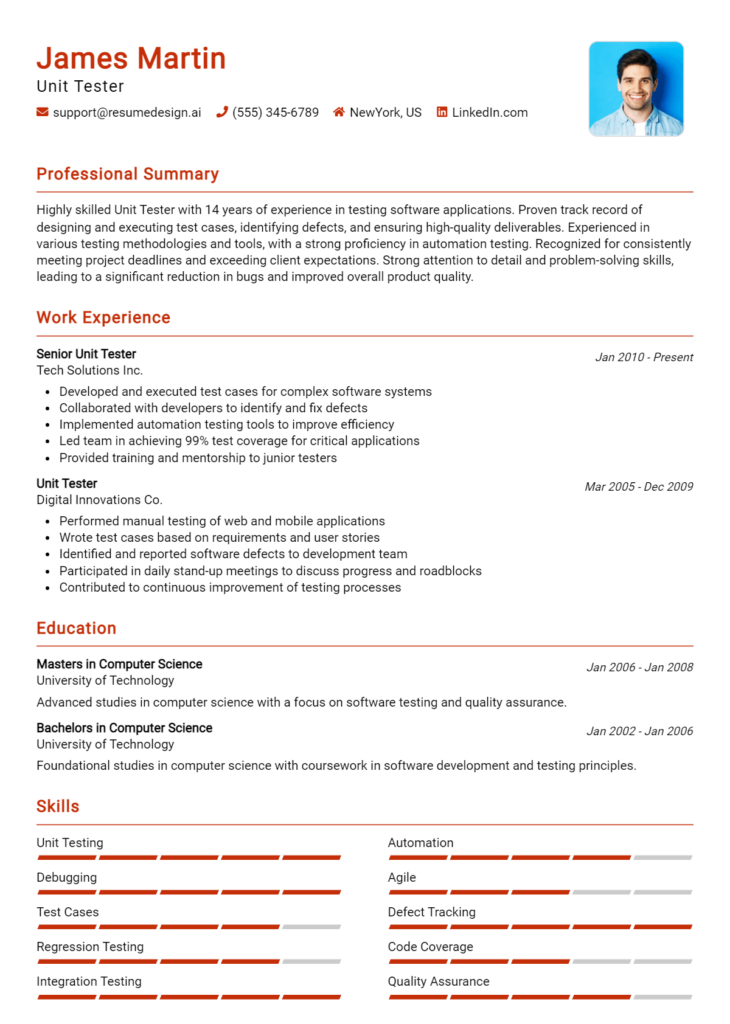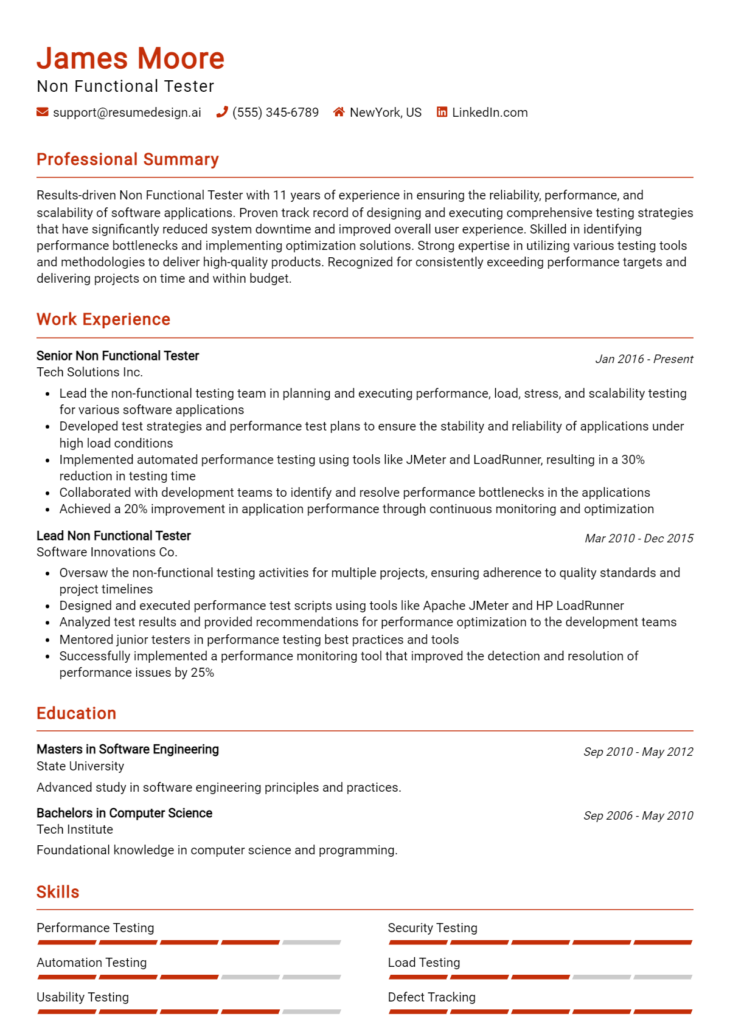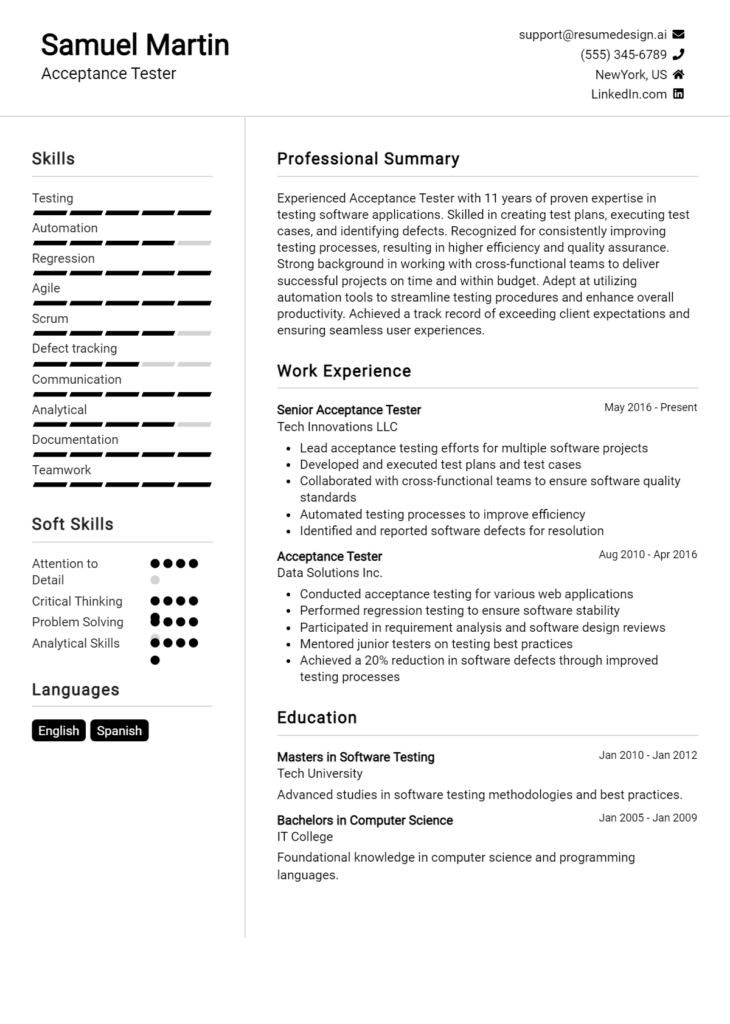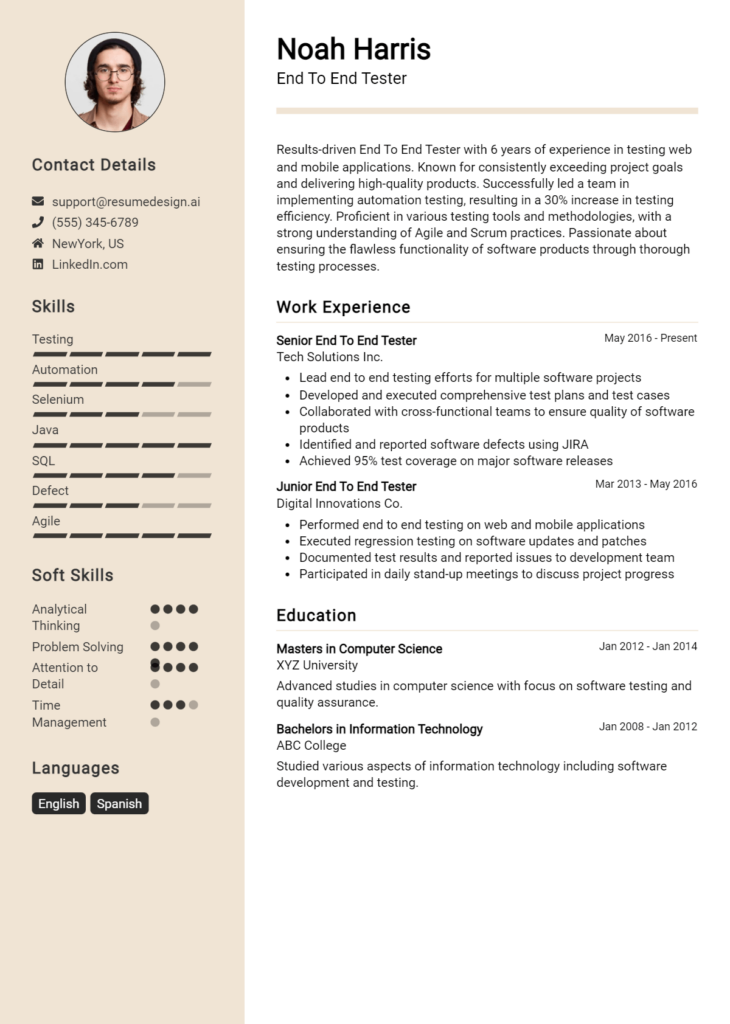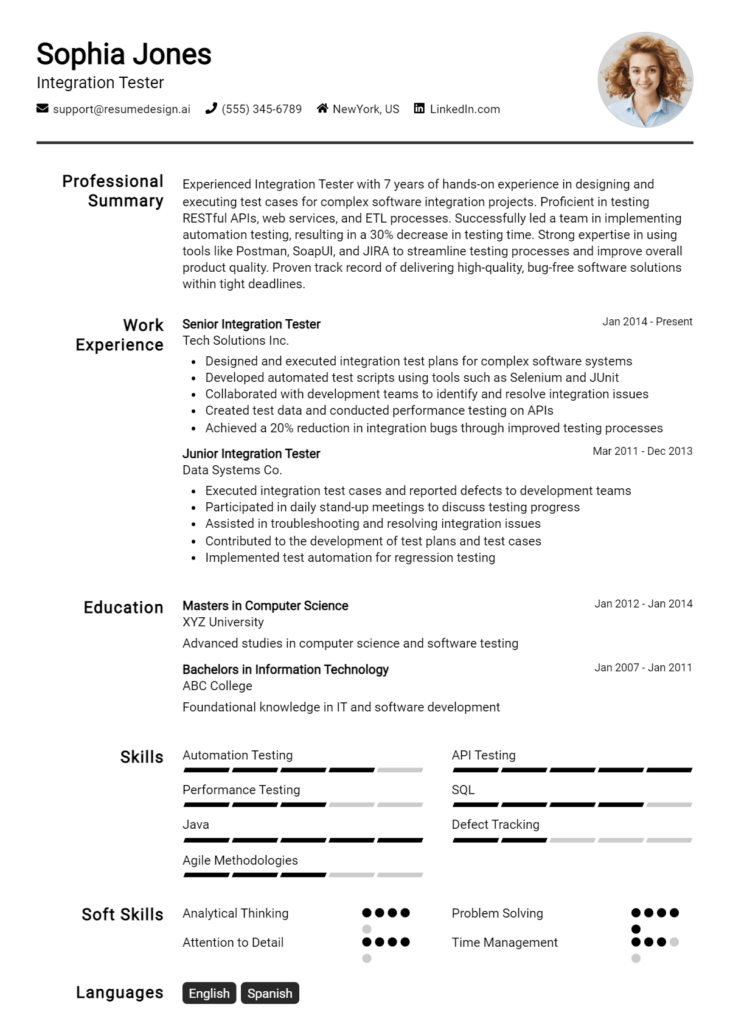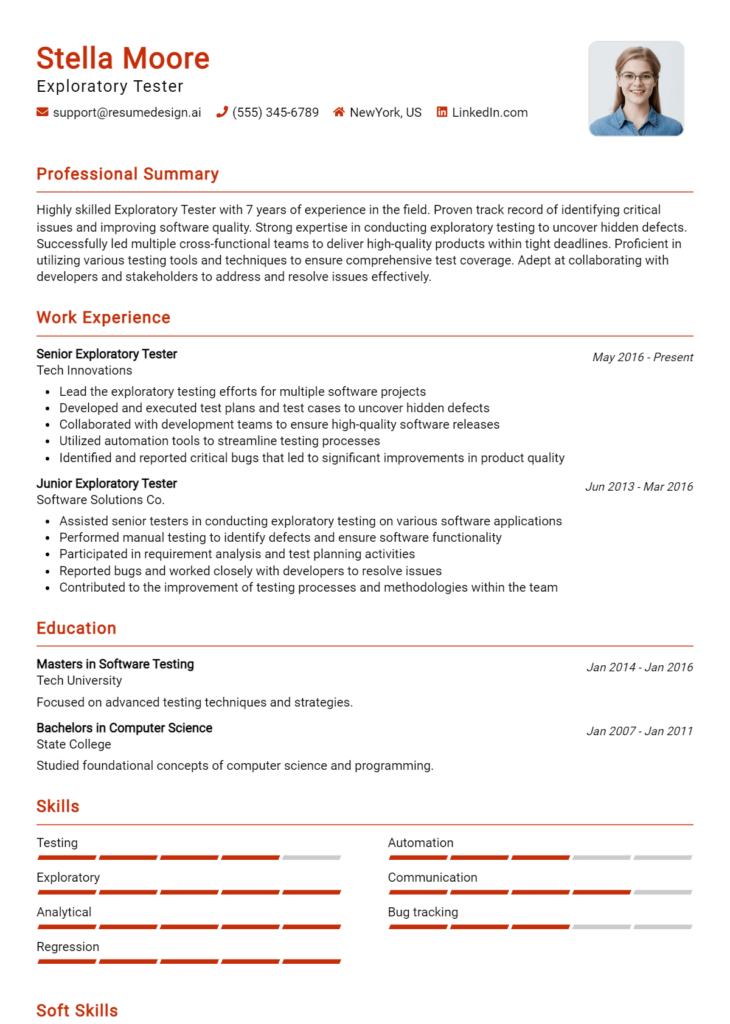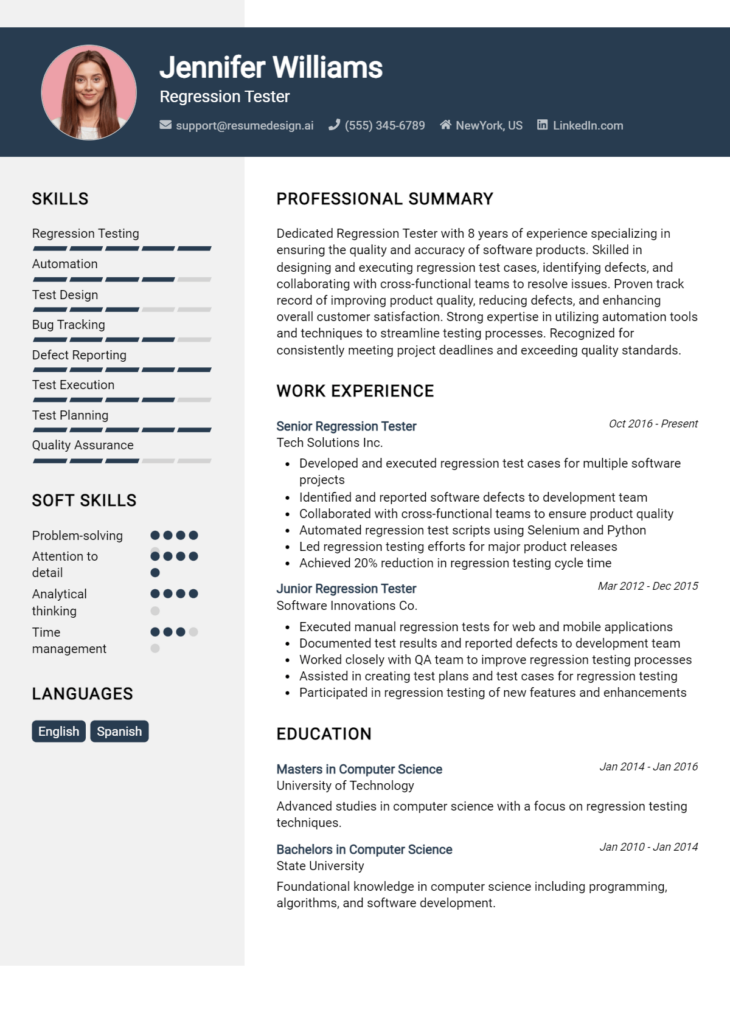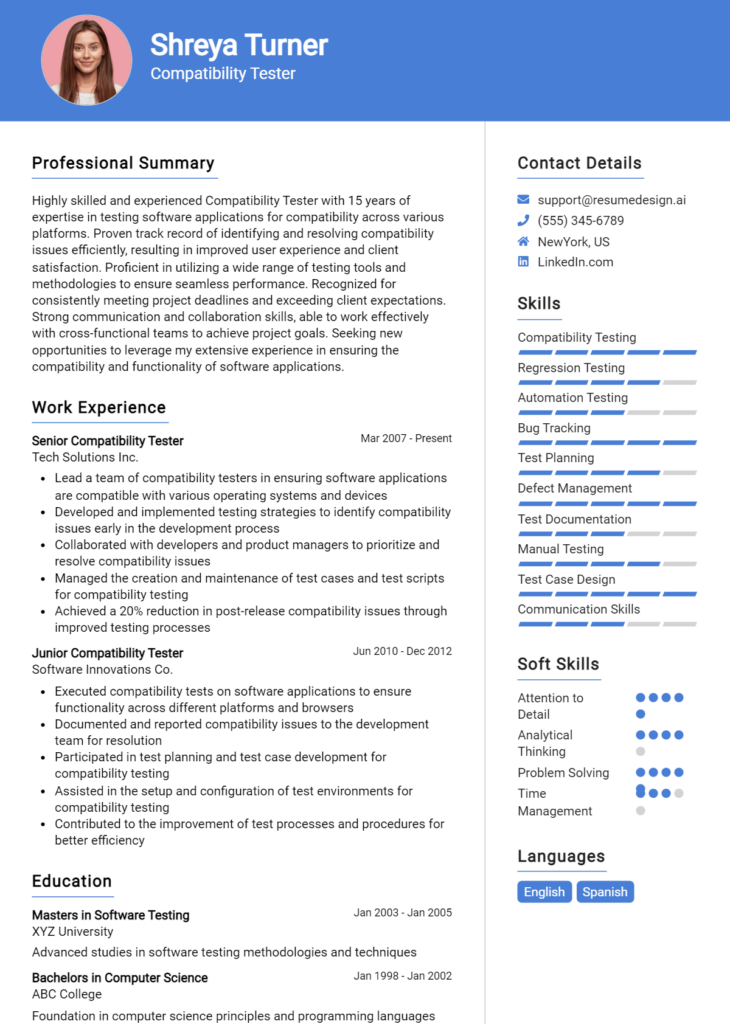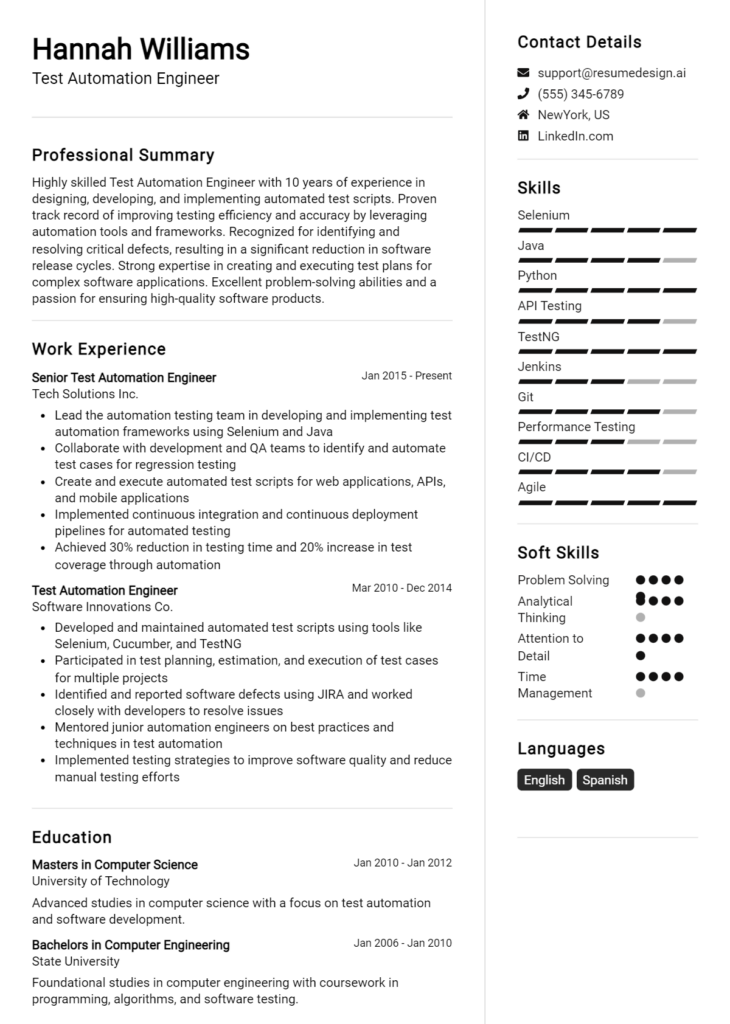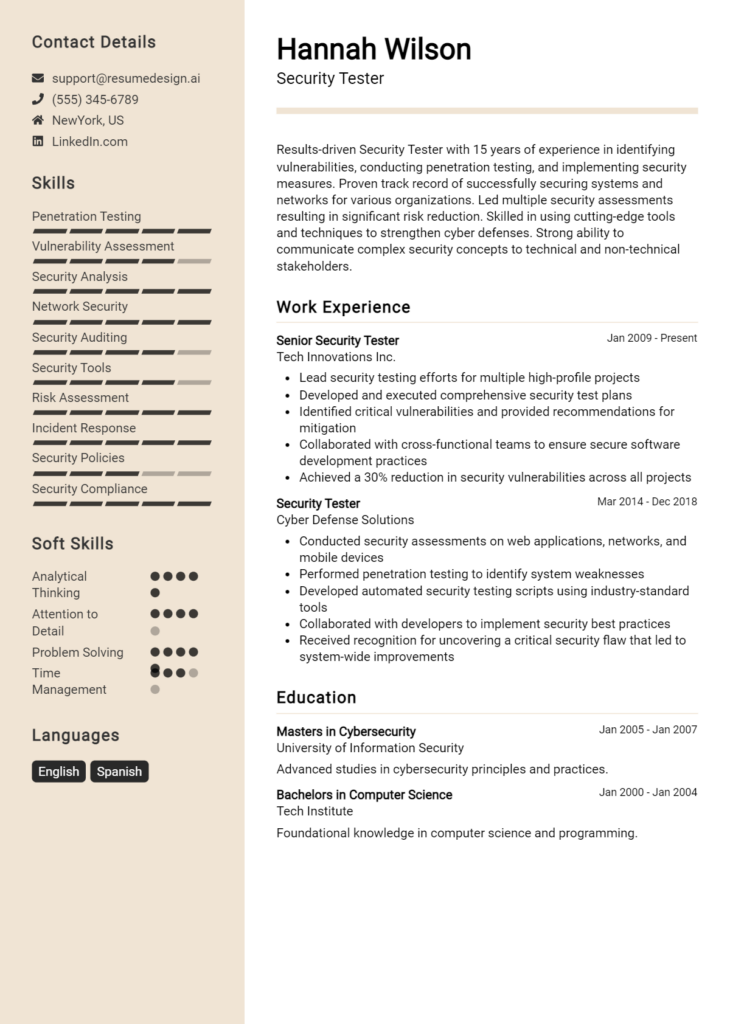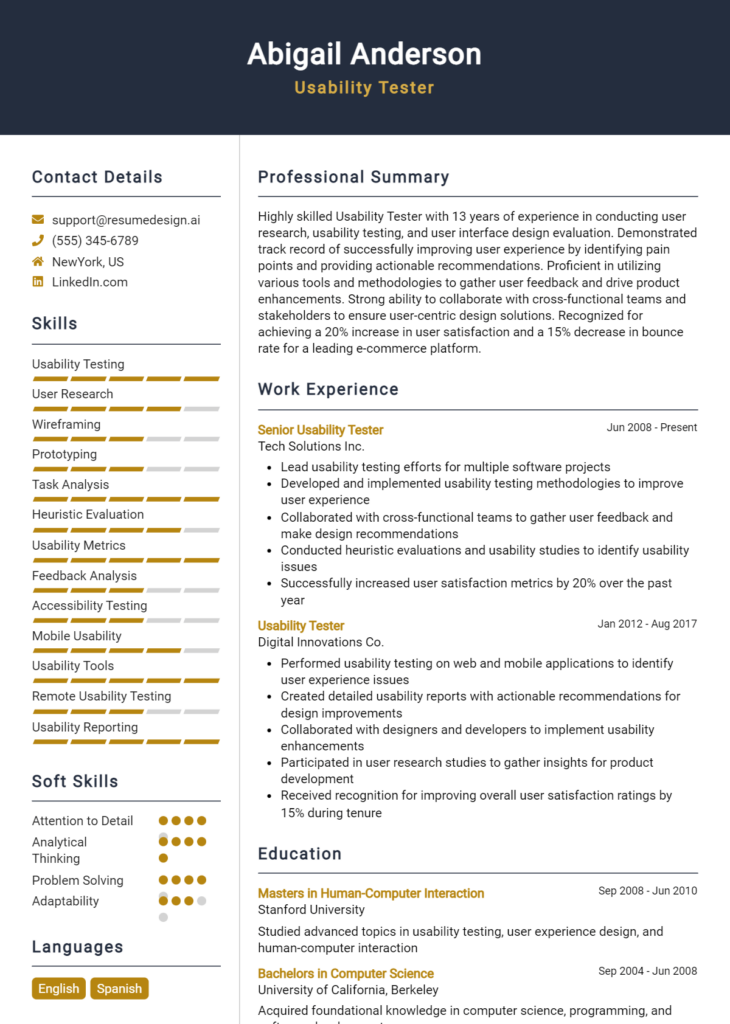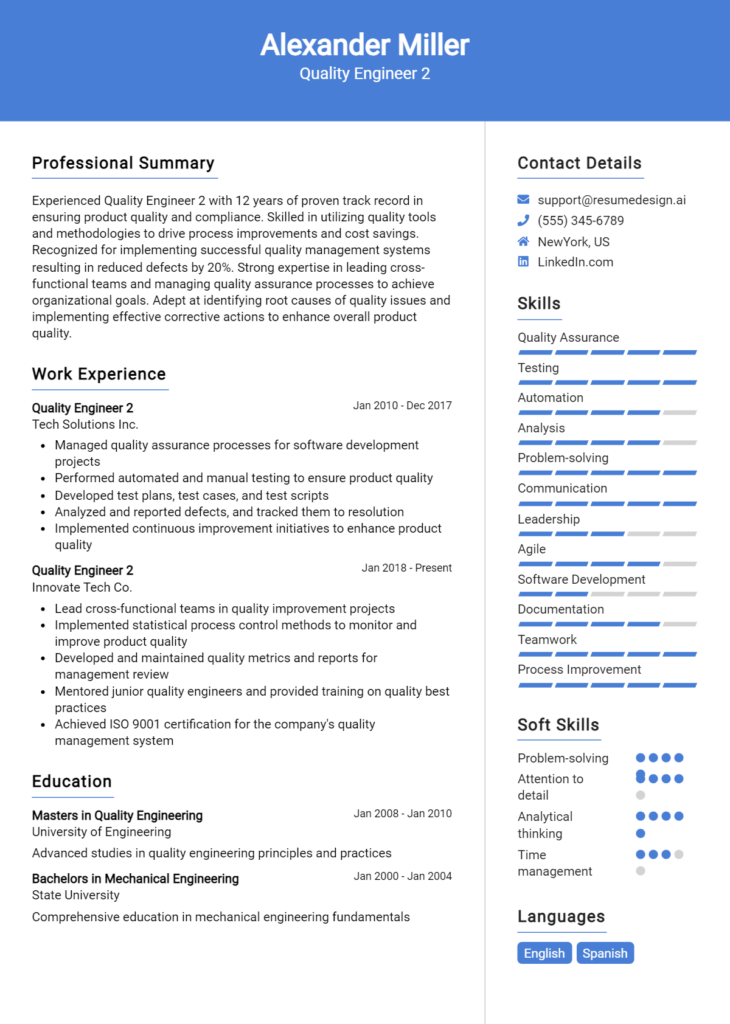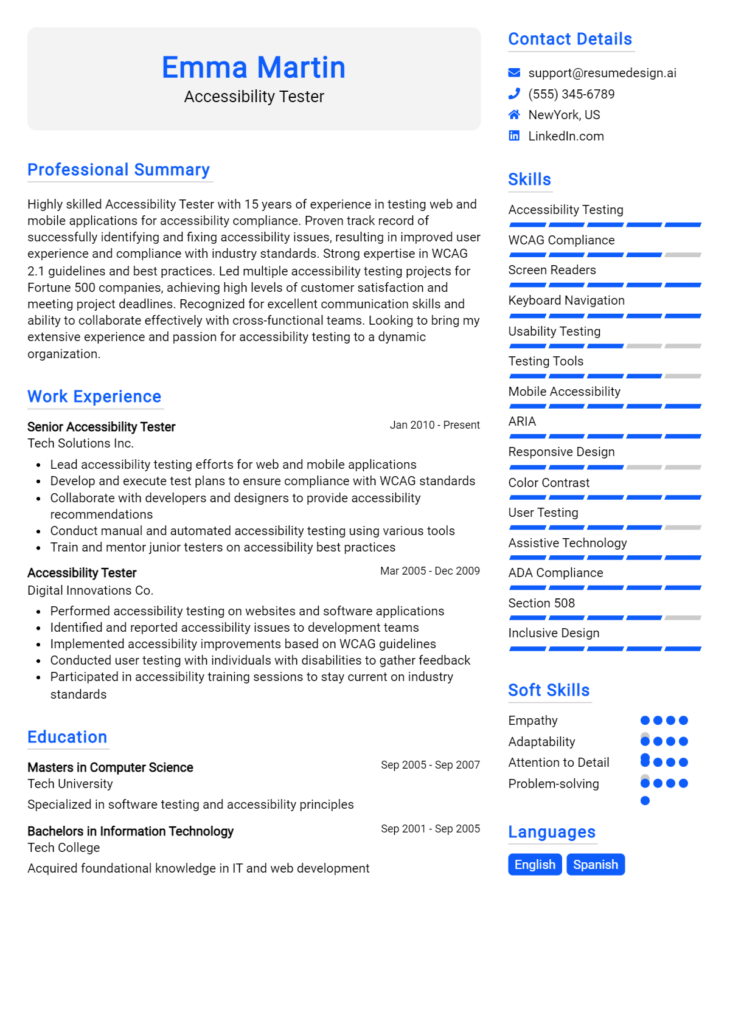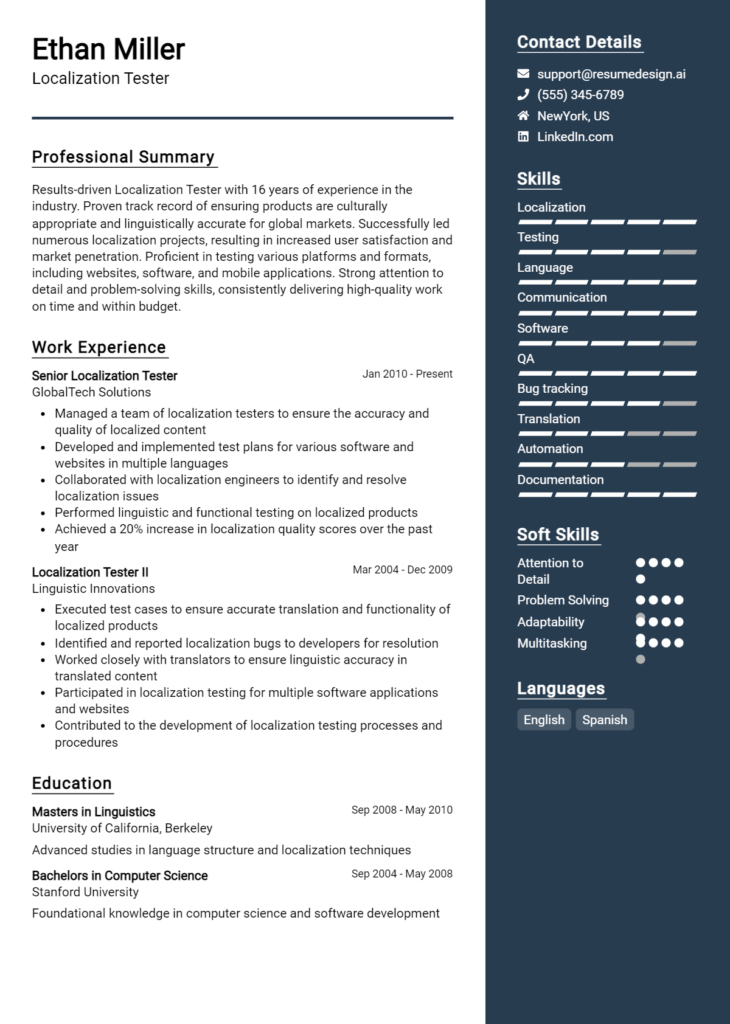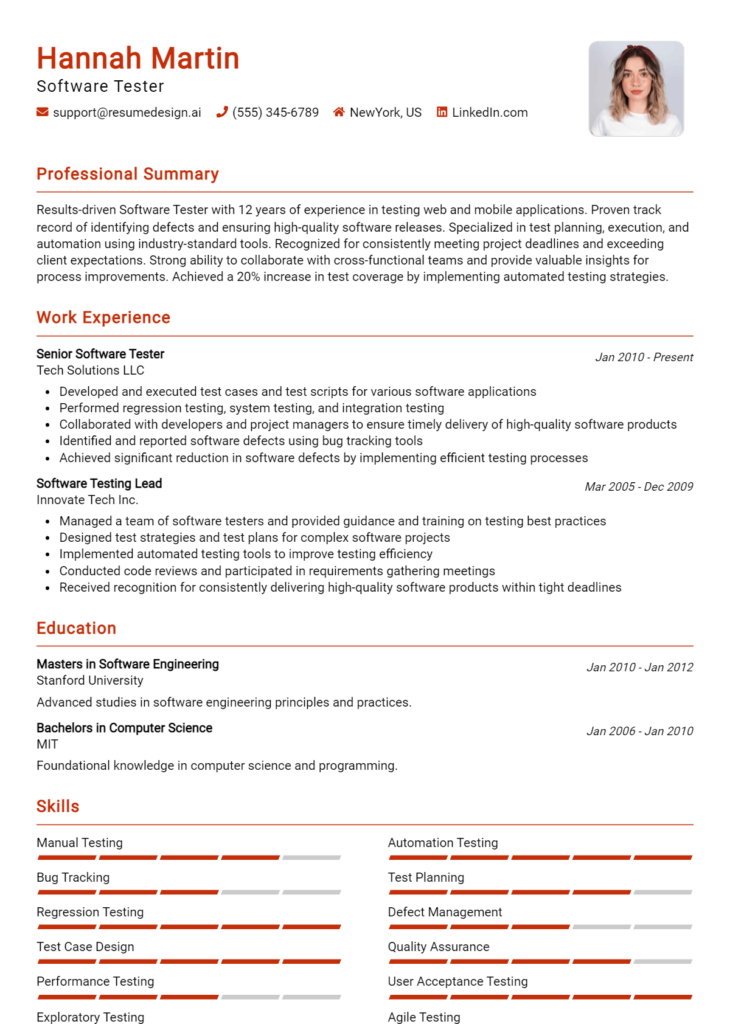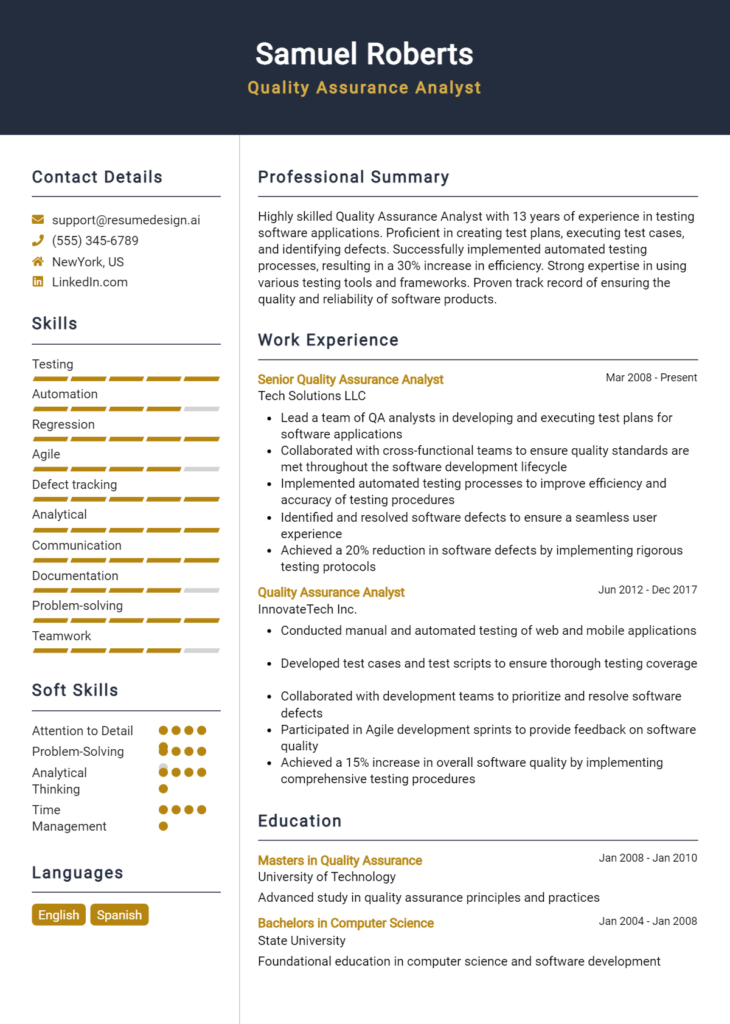Performance Tester Core Responsibilities
Performance Testers play a crucial role in ensuring that applications operate efficiently under various conditions. They bridge development, quality assurance, and operations by conducting rigorous testing to identify bottlenecks and performance issues. Success in this role requires strong technical skills in automation tools, in-depth knowledge of performance metrics, and analytical problem-solving abilities. These competencies contribute to optimizing system performance, ensuring user satisfaction, and achieving organizational goals. A well-structured resume highlighting these skills can significantly enhance job prospects.
Common Responsibilities Listed on Performance Tester Resume
- Design and execute performance test plans and strategies.
- Develop and maintain automated performance testing scripts.
- Analyze and report on performance test results, identifying bottlenecks.
- Collaborate with development and QA teams to resolve performance issues.
- Monitor system performance and conduct load testing.
- Utilize performance testing tools such as JMeter, LoadRunner, or Gatling.
- Document testing processes and maintain testing environments.
- Provide recommendations for performance enhancements.
- Participate in root cause analysis for performance-related incidents.
- Stay updated on industry trends and performance testing methodologies.
- Assist in capacity planning and performance forecasting.
- Engage in continuous improvement of performance testing practices.
High-Level Resume Tips for Performance Tester Professionals
In the competitive field of Performance Testing, your resume serves as the critical first impression you make on potential employers. A well-crafted resume not only showcases your technical skills and experience but also tells the story of your achievements in a way that resonates with hiring managers. It's essential to reflect your expertise in performance testing methodologies, tools, and processes, as well as your ability to contribute to a team's success. In this guide, we will provide practical and actionable resume tips specifically tailored for Performance Tester professionals, empowering you to create a standout document that captures your qualifications and sets you apart from the competition.
Top Resume Tips for Performance Tester Professionals
- Tailor your resume to the job description by incorporating relevant keywords and phrases that align with the specific requirements of the position.
- Highlight your experience with performance testing tools and technologies, such as JMeter, LoadRunner, or Gatling, in a dedicated skills section.
- Quantify your achievements by including metrics that demonstrate the impact of your work, such as improved performance metrics or reduced load times.
- Include a summary statement at the top of your resume that captures your professional identity and key qualifications as a Performance Tester.
- Showcase relevant certifications, such as ISTQB or other industry-recognized qualifications, to enhance your credibility in the field.
- Detail your experience with performance testing methodologies and practices, emphasizing any Agile or DevOps environments you have worked in.
- Use action verbs in your bullet points to convey your contributions and responsibilities dynamically.
- List noteworthy projects you have worked on, providing context on the scope and outcomes of your contributions.
- Incorporate soft skills such as communication and teamwork, which are vital in collaborating with development and QA teams.
By implementing these targeted resume tips, you can significantly increase your chances of landing a job in the Performance Tester field. A polished and tailored resume will not only highlight your skills and accomplishments but also demonstrate your understanding of the role and its demands, making you a compelling candidate for potential employers.
Why Resume Headlines & Titles are Important for Performance Tester
In the competitive field of performance testing, a resume headline or title serves as the first impression a hiring manager receives from a candidate. It is a crucial element that can significantly impact the chances of landing an interview. A well-crafted headline succinctly encapsulates a candidate's key qualifications, skills, and experience in a single impactful phrase. This not only grabs the attention of hiring managers but also provides a clear overview of what the candidate brings to the table, making it easier for them to evaluate the applicant's fit for the role. Therefore, the headline should be concise, relevant, and directly aligned with the specific job being applied for, setting the stage for the rest of the resume.
Best Practices for Crafting Resume Headlines for Performance Tester
- Keep it concise: Aim for a headline that is no longer than one or two lines.
- Be specific: Use industry-specific terminology and highlight relevant skills.
- Showcase accomplishments: Mention notable achievements or certifications if applicable.
- Use action words: Start with strong action verbs to convey confidence and expertise.
- Tailor to the job: Customize your headline for each application to align with the job description.
- Avoid jargon: While industry terms are important, overly technical language may alienate non-technical recruiters.
- Highlight key skills: Focus on the skills that are most relevant to performance testing.
- Make it impactful: Aim for a headline that resonates and leaves a lasting impression.
Example Resume Headlines for Performance Tester
Strong Resume Headlines
"Results-Driven Performance Tester with 5+ Years of Experience in Load and Stress Testing"
“Certified Performance Testing Specialist Skilled in Automation and Performance Tuning”
“Performance Testing Expert with Proven Track Record in Enhancing Application Speed and Reliability”
Weak Resume Headlines
“Looking for a Job as a Tester”
“Performance Tester with Experience”
Strong resume headlines are effective because they clearly communicate the candidate's specific skills and salient accomplishments, making them stand out to hiring managers. They provide a snapshot of the candidate's professional identity and relevance to the role. In contrast, weak headlines fail to impress as they are vague, generic, and do not convey a clear picture of the candidate's qualifications, thereby missing the opportunity to engage the reader's interest.
Writing an Exceptional Performance Tester Resume Summary
A well-crafted resume summary for a Performance Tester is crucial as it serves as the first impression a hiring manager will have of a candidate. This brief yet impactful section encapsulates the candidate's key skills, relevant experience, and notable accomplishments, effectively drawing attention to their qualifications. A strong summary not only highlights essential competencies such as performance testing methodologies and tools but also illustrates the candidate's ability to deliver results in real-world scenarios. It should be concise, compelling, and tailored to align with the specific requirements of the job being applied for, ensuring that it resonates with the hiring manager and sets the tone for the rest of the resume.
Best Practices for Writing a Performance Tester Resume Summary
- Quantify achievements: Use numbers and metrics to demonstrate your impact, such as "improved system performance by 30%."
- Focus on relevant skills: Highlight specific tools and methodologies you are proficient in, such as JMeter, LoadRunner, or performance tuning.
- Tailor the summary: Customize the summary for each job application to reflect the job description and requirements.
- Keep it concise: Aim for 3-4 impactful sentences that convey your key qualifications without unnecessary details.
- Use action verbs: Start sentences with strong action verbs to make your accomplishments sound more dynamic.
- Showcase industry knowledge: Mention any relevant certifications or standards you adhere to in performance testing.
- Highlight problem-solving abilities: Emphasize your ability to identify performance issues and implement effective solutions.
- Reflect your career goals: Briefly indicate your professional aspirations in the field of performance testing.
Example Performance Tester Resume Summaries
Strong Resume Summaries
Performance Tester with over 5 years of experience in optimizing application performance. Successfully led a team to achieve a 40% reduction in load times for high-traffic web applications, utilizing JMeter and LoadRunner.
Detail-oriented Performance Tester skilled in automated testing and performance analysis. Enhanced system reliability by 35% through rigorous stress testing and real-time monitoring, contributing to a 20% increase in customer satisfaction ratings.
Results-driven Performance Tester with expertise in performance tuning and scalability testing. Achieved a 50% improvement in system throughput by identifying bottlenecks and implementing targeted optimization strategies.
Weak Resume Summaries
Experienced Performance Tester looking for a new opportunity. I have worked on various projects and have some knowledge of testing tools.
Performance Tester with a background in IT. I am familiar with performance testing but have not done much in my previous roles.
The strong resume summaries stand out due to their specificity, quantifiable achievements, and relevant skills that directly align with the Performance Tester role. They effectively convey the candidate's contributions and impact in previous positions, making them compelling to hiring managers. In contrast, the weak summaries lack detail and clarity, failing to provide any measurable outcomes or demonstrate the candidate's expertise, thus making them less appealing in the competitive job market.
Work Experience Section for Performance Tester Resume
The work experience section of a Performance Tester resume is pivotal in demonstrating a candidate's technical expertise and practical application of performance testing methodologies. This section not only highlights the candidate's ability to manage teams and collaborate effectively but also showcases their success in delivering high-quality products under varying conditions. By quantifying achievements and aligning experiences with industry standards, candidates can provide clear evidence of their impact on previous projects, making them stand out to potential employers.
Best Practices for Performance Tester Work Experience
- Detail specific tools and technologies used in performance testing, such as JMeter, LoadRunner, or Gatling.
- Quantify results achieved, such as performance improvements or reduced load times, to demonstrate your impact.
- Highlight your role in collaborative projects, emphasizing teamwork and communication skills.
- Describe your contributions to performance testing strategies and methodologies.
- Include certifications or training relevant to performance testing that enhance your qualifications.
- Focus on results-oriented language to convey a sense of accomplishment and responsibility.
- Match your experiences with industry standards and practices to show alignment with employer expectations.
- Use action verbs to start each bullet point, showcasing proactive involvement in your roles.
Example Work Experiences for Performance Tester
Strong Experiences
- Led a team of 5 in executing performance testing for a critical banking application, resulting in a 30% reduction in server response time.
- Implemented automated performance testing scripts using JMeter, which decreased testing time by 40% and improved defect detection rates.
- Collaborated with cross-functional teams to analyze application performance under stress, leading to the identification and resolution of 15 critical bottlenecks.
- Designed and executed load testing scenarios for a cloud-based service, achieving a successful scale-up during peak usage periods with zero downtime.
Weak Experiences
- Performed testing on various applications.
- Worked on a team to ensure performance was acceptable.
- Involved in some performance testing tasks.
- Helped with troubleshooting issues that arose.
The examples labeled as strong experiences provide clear, quantifiable outcomes and demonstrate leadership, technical skills, and effective collaboration within teams. They highlight specific achievements and the tools used, which are crucial for performance testing roles. In contrast, the weak experiences lack detail and quantification, making them less impactful and failing to convey a strong sense of contribution or technical capability. This distinction is essential for capturing the attention of hiring managers and showcasing the candidate's true potential in performance testing.
Education and Certifications Section for Performance Tester Resume
The education and certifications section of a Performance Tester resume is crucial as it showcases the candidate's academic background and demonstrates their commitment to continuous learning in a rapidly evolving field. This section not only highlights relevant degrees and specialized training but also emphasizes industry-recognized certifications that validate the candidate's expertise. By providing details about relevant coursework and certifications, candidates can enhance their credibility and align their qualifications with the specific requirements of the Performance Tester role, thereby making a strong impression on potential employers.
Best Practices for Performance Tester Education and Certifications
- Include only relevant degrees and certifications that pertain to performance testing and quality assurance.
- Detail specialized training and workshops that enhance your skills in performance testing tools and methodologies.
- List certifications from recognized industry bodies, such as ISTQB or Certified Agile Tester, to validate your expertise.
- Provide context for your educational background by including relevant coursework that directly relates to performance testing.
- Highlight any advanced degrees, such as a Master's in Computer Science or Software Engineering, which can set you apart.
- Keep the section updated with recent certifications or courses to demonstrate your commitment to continuous learning.
- Use clear formatting to make educational achievements stand out, such as bullet points or distinct categories.
- Consider including a brief description of how your education has directly contributed to your performance testing skills.
Example Education and Certifications for Performance Tester
Strong Examples
- Bachelor of Science in Computer Science, XYZ University, 2020
- Certified Software Tester (CST) from the International Institute for Software Testing, 2022
- Performance Testing with JMeter - Online Certification Course, 2021
- Agile Testing and Quality Assurance Workshop, 2023
Weak Examples
- High School Diploma, ABC High School, 2015
- Certification in Basic Computer Skills, 2018
- Old certification in Manual Testing, 2016 (no longer relevant)
- Training in Microsoft Office Suite, 2019
The strong examples are considered effective because they directly relate to performance testing, showcasing relevant educational qualifications and recognized certifications that enhance the candidate's expertise. In contrast, the weak examples lack relevance to the performance testing field, featuring outdated or basic credentials that do not demonstrate the necessary skills or knowledge required for the role. This distinction is crucial for prospective employers looking for qualified candidates in performance testing.
Top Skills & Keywords for Performance Tester Resume
As a Performance Tester, having the right skills is crucial to proving your expertise and ensuring the effectiveness of your resume. Performance testing is an essential aspect of software development, as it evaluates the speed, scalability, and stability of applications under various conditions. Demonstrating both hard and soft skills can set you apart from other candidates, showcasing your technical proficiency and your ability to communicate and collaborate with team members. A well-crafted resume that highlights these skills will not only attract the attention of hiring managers but also increase your chances of landing an interview. To enhance your resume, consider including a mix of skills that reflect your qualifications for the role.
Top Hard & Soft Skills for Performance Tester
Soft Skills
- Strong analytical thinking
- Excellent communication skills
- Team collaboration
- Problem-solving ability
- Attention to detail
- Time management
- Adaptability
- Critical thinking
- Conflict resolution
- Customer-oriented mindset
Hard Skills
- Proficiency in performance testing tools (e.g., LoadRunner, JMeter)
- Knowledge of scripting languages (e.g., Python, Java)
- Experience with continuous integration/continuous deployment (CI/CD)
- Understanding of database management (SQL, NoSQL)
- Familiarity with cloud services (AWS, Azure)
- Capability to analyze performance metrics
- Strong grasp of networking concepts
- Experience with API testing
- Knowledge of web application architecture
- Understanding of Agile methodologies
By integrating these skills into your resume and linking them to your work experience, you can create a compelling narrative that demonstrates your qualifications and readiness for the Performance Tester role.
Stand Out with a Winning Performance Tester Cover Letter
Dear [Hiring Manager's Name],
I am excited to apply for the Performance Tester position at [Company Name] as advertised on [Job Board/Company Website]. With a strong background in performance testing and a passion for delivering high-quality software solutions, I am confident in my ability to contribute effectively to your team. My experience with various performance testing tools, such as JMeter and LoadRunner, combined with my analytical skills, allows me to identify bottlenecks and optimize applications to ensure they meet both user expectations and business requirements.
In my previous role at [Previous Company Name], I successfully led performance testing initiatives for multiple high-stakes projects. I collaborated closely with developers and product managers to define testing strategies, establish benchmarks, and analyze results. By implementing systematic testing approaches, I helped reduce response times by up to 30%, significantly enhancing the user experience. My ability to communicate complex technical issues in an understandable manner has also enabled me to advocate for performance improvements across teams effectively.
I am particularly drawn to [Company Name] due to its commitment to innovation and quality. I admire your focus on leveraging cutting-edge technology to improve user experiences, and I am eager to bring my expertise in performance testing to your organization. I believe that my proactive approach and dedication to continuous improvement will align well with your team's goals.
Thank you for considering my application. I look forward to the opportunity to discuss how my skills and experiences can contribute to the success of [Company Name]. I am excited about the possibility of working together to enhance the performance and reliability of your applications.
Sincerely,
[Your Name]
[Your Phone Number]
[Your Email Address]
Common Mistakes to Avoid in a Performance Tester Resume
When crafting a resume for a Performance Tester position, it's crucial to present your skills and experience in a way that effectively highlights your qualifications. However, many candidates make common mistakes that can undermine their chances of landing an interview. By avoiding these pitfalls, you can create a more compelling and impactful resume that showcases your expertise in performance testing.
Vague Job Descriptions: Failing to provide specific details about your previous roles can lead to confusion. Be clear about your responsibilities and accomplishments in each position.
Ignoring Relevant Tools and Technologies: Not mentioning specific performance testing tools (like JMeter, LoadRunner, or Gatling) can make your resume less appealing to potential employers looking for expertise with these technologies.
Lack of Quantifiable Achievements: Resumes that don’t include metrics or quantifiable results (e.g., "Improved load times by 30%") fail to demonstrate the impact of your work.
Too Much Technical Jargon: While it’s important to show your technical skills, using excessive jargon can alienate non-technical hiring managers. Aim for a balance between technical terms and clear communication.
Neglecting Soft Skills: Performance testing isn’t just about technical ability; soft skills like teamwork, communication, and problem-solving are essential. Failing to highlight these can diminish your overall appeal.
Outdated Information: Including outdated technologies or skills can suggest that you’re not keeping up with industry trends. Ensure your resume reflects your most current knowledge.
Poor Formatting: A cluttered or confusing layout can detract from the content of your resume. Use clear headings, bullet points, and consistent formatting to enhance readability.
Lack of Customization: Sending the same generic resume to every job can reduce your effectiveness. Tailor your resume for each position by aligning your skills and experiences with the job description.
Conclusion
As a Performance Tester, your role is critical in ensuring that applications can handle expected user loads and perform optimally under stress. Throughout this article, we've discussed the essential skills and tools that you should highlight in your resume, such as proficiency in performance testing tools like JMeter and LoadRunner, as well as your ability to analyze results and communicate findings effectively.
We also emphasized the importance of showcasing your experience with scripting and automation, as well as your understanding of various performance metrics and benchmarks. By tailoring your resume to reflect these competencies, you can stand out in a competitive job market.
Now is the time to take action! Review your Performance Tester resume to ensure it effectively showcases your qualifications and aligns with the expectations of potential employers. To assist you in this process, we recommend utilizing available resources such as resume templates, which can provide a professional layout, or the resume builder that guides you through creating a tailored resume. Additionally, check out resume examples for inspiration and consider crafting a compelling cover letter using our cover letter templates. Take the next step in advancing your career by enhancing your resume today!

